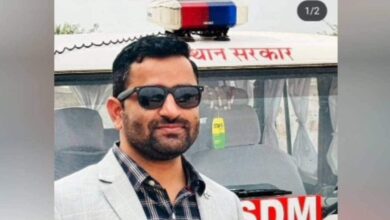Rajasthan
Rajasthan to organise special camps to vaccinate people with disabilities | Jaipur News

JAIPUR: The state’s health department has issued an order to organise special vaccination camps for persons with disabilities (PwDs) who are above 18 years at centres run by NGOs or private organisations after registering 100 or more such people.
The decision follows a notice sent by the State Human Rights Commission (SHRC) which took cognizance of the matter. The order also stated that if an NGO or a private organisation manages to register only less than 100 PwDs, they will be given special priority to get inoculated at the nearest Covid vaccination centre.
The order has been issued to all chief medical and health officers (CMHOs) and district reproductive & child health officers. “Special Covid vaccination centres (for those above 18 years of age) could be set up at those NGOs/private organisations on registration of 100 or more PWDs. If less than 100 specially-abled persons are registered with an NGO/ private organization, special priority will be given to them at the nearest Covid vaccination centre for vaccination,” the order said.
The SHRC had issued a notice to the principal secretary, medical and health department, on the matter.
Chairman of the commission Justice Gopal Krishna Vyas had demanded special arrangements for vaccination of PwDs and asked the government to send a report within a week.
There are about 21 lakh specially-abled persons in Rajasthan.
“Based on my petition, the human rights commission had issued a notice to the principal secretary, medical and health, and given directions to resolve the problem faced by specially-abled persons regarding vaccination. The commission has also asked the department to submit a report within a week after resolving the issue. The next hearing is on May 20,” said Hemant Bhai Goyal, national vice-president, Divyang Adhikar Mahasangh. “I had written that it was a risky task to take specially-abled persons to vaccination centres. There are 21 categories of specially-abled persons in the state, including intellectual disability, severe disability, blind and others with mental disease. Also, they are dependent on others for any kind of work. Hence, there is a risk of infection spreading among them,” said Goyal.
The decision follows a notice sent by the State Human Rights Commission (SHRC) which took cognizance of the matter. The order also stated that if an NGO or a private organisation manages to register only less than 100 PwDs, they will be given special priority to get inoculated at the nearest Covid vaccination centre.
The order has been issued to all chief medical and health officers (CMHOs) and district reproductive & child health officers. “Special Covid vaccination centres (for those above 18 years of age) could be set up at those NGOs/private organisations on registration of 100 or more PWDs. If less than 100 specially-abled persons are registered with an NGO/ private organization, special priority will be given to them at the nearest Covid vaccination centre for vaccination,” the order said.
The SHRC had issued a notice to the principal secretary, medical and health department, on the matter.
Chairman of the commission Justice Gopal Krishna Vyas had demanded special arrangements for vaccination of PwDs and asked the government to send a report within a week.
There are about 21 lakh specially-abled persons in Rajasthan.
“Based on my petition, the human rights commission had issued a notice to the principal secretary, medical and health, and given directions to resolve the problem faced by specially-abled persons regarding vaccination. The commission has also asked the department to submit a report within a week after resolving the issue. The next hearing is on May 20,” said Hemant Bhai Goyal, national vice-president, Divyang Adhikar Mahasangh. “I had written that it was a risky task to take specially-abled persons to vaccination centres. There are 21 categories of specially-abled persons in the state, including intellectual disability, severe disability, blind and others with mental disease. Also, they are dependent on others for any kind of work. Hence, there is a risk of infection spreading among them,” said Goyal.




